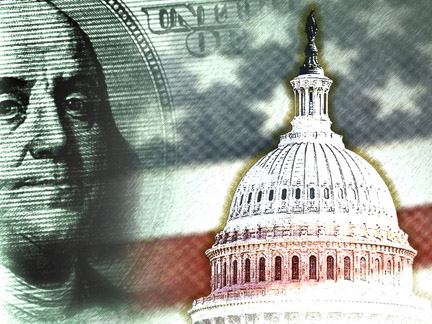Over the last month, Washington has been abuzz with heated rhetoric about the U.S. debt ceiling. The debate between the Republicans and the Democrats over this issue range from the absurd to the downright insane. From our vantage point, its difficult to understand whether we as ordinary citizens should be concerned or simply file it away as another over-hyped D.C. issue. In order to answer this question we must fully understand the issue.
So, what is the debt ceiling exactly?
Does it mean our debts have risen so high that it can touch the ceiling!
Unofficially yes.. Officially No! The debt ceiling is a cap set by Congress on the amount of debt the federal government can legally borrow. Basically, the US gold card…um…I mean platinum card… um…more like Black Diamond credit card has been cut up. For most of us, I’m sure our initial thoughts are “well this is a good thing”. But as you dig deeper into the issue you’ll find that the obvious answer is not that clear. Furthermore, the minority community stands the most to lose if the US credit card is not glued back together.
Today, the US debt stands at about $14.29 trillion dollars. I couldn’t imagine having debt this large! Most of us don’t have 1% of this debt in our personal lives. The reality is this credit is needed to fund obligations already legislated by Congress such as Medicare, Social Security, Welfare, Education loans and a host of other entitlements that many in our community enjoy. Hitting the debt ceiling would hurt the government’s ability to finance these programs and thus we will feel the pain in the form of letters saying that the “check is not in the mail”.
If Congress fails to raise the debt limit, which is basically refusing to “glue the US credit card back together”, then the government can no longer borrow funds, which means other means of US revenue will have to be considered. That means.. higher taxes.
Most experts agree that the potential negative consequences of this are too catastrophic to contemplate. Whether it’s under funded entitlement programs or higher taxes, the impact of this issue will hit and hurt all of us. So no matter your political affiliation, please pay attention to the debate. Then let your Representative know how you feel.
As Washington continues to play politics; real lives hang in the balance.
Unfortunately, it’s usually our lives that feel the blunt of it. The hits just keep on coming!
Readers May Also Like:

MINAJ Act Unveiled By NY Politician — What the Bill Entails

Food Stamp Benefits Cut Despite Soaring Grocery Prices

Malcolm X Kin Filing New Lawsuit Against NYC Agencies & NYPD In Regards To Assassination

Idris Elba Working With Africa in a Major Way — Here’s How

